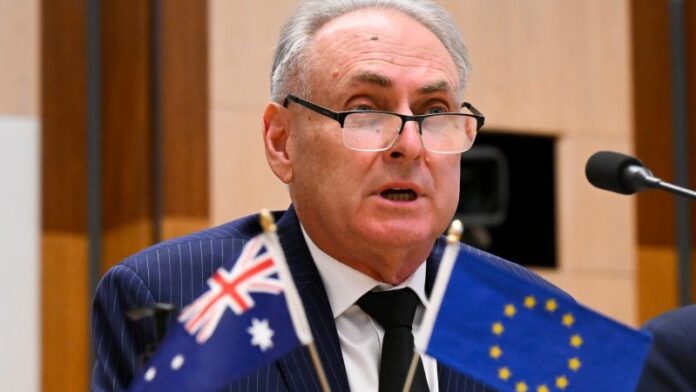Meeting at the margins of the G7 meeting in Osaka on Sunday, EU and Australian trade representatives failed to conclude negotiations on a free trade agreement due to persistent disagreements on agricultural market access, according to Euractiv.
“Unfortunately, we have not been able to make progress,” Australian Trade Minister Don Farrell said in a video statement on Sunday.
A spokesperson of the European Commission said that the Commission regretted “the lack of progress made during talks in Osaka,” where Trade Commissioner Valdis Dombrovskis and Agriculture Commissioner Janusz Wojciechowski were both in attendance for what they hoped would be the final round of negotiations.
“There was optimism that a deal was within reach,” the Commission spokesperson said, accusing the Australian negotiators of walking back on earlier progress.
“The Australian side re-tabled agricultural demands that did not reflect recent negotiations and the progress made between senior officials.”
At the time of writing, the Australian government did not comment on these allegations.
Work on the free trade agreement began in 2018 and was paused in 2021 after Australia ditched France for the US and the UK on a submarine deal.
In July, when a trade deal seemed very near, Trade Minister Farrell walked away from negotiations in Brussels as he was unsatisfied with the European market access offers, claiming that he had to go back to Australia to consult with the rest of the government.
While EU officials showed themselves surprised at this behaviour, negotiations continued on a technical level.
The main remaining issue is the question of agricultural market access. Australia wants better market access for its sheep meat and beef producers, which the EU is reluctant to grant as countries like France and Ireland oppose this.
Agriculture lobbies in Australia and Europe are heavily involved in the negotiations and put pressure on their relative decision-makers.
The EU Commission wants to get an agreement before the end of the year, as EU elections in mid-2024 could reshuffle personnel and priorities. What Sunday’s failure to reach an agreement means for the future of the FTA is unclear for now.
Ahead of the meeting, Farrell had said that failing to reach an agreement would mean that the negotiations would have to be paused for a while.
“From this point forward, if we haven’t got a deal, the Europeans move into their electoral cycle for elections next year, and I think we will have lost the opportunity for two, perhaps three years to come back and resolve this,” he said in a podcast interview on 25 October.
On Sunday, the trade minister said: “Negotiations will continue, and I’m hopeful that one day we will be able to sign a deal that benefits Australia and our European friends.”
The Commission spokesperson said: “The European Commission stands ready to continue negotiations.”
In a post on X (formerly Twitter), Agriculture Commissioner Wojciechowski said that “more realistic expectations and a balanced approach” were needed to move forward.


